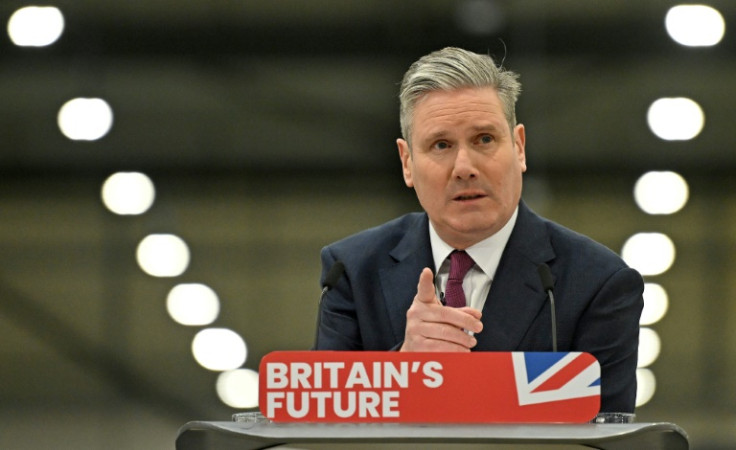Starmer Faces Rising Criticism Over Plans To Drop £28 Billion Green Investment Pledge
Starmer is expected to argue that it will not affect specific pledges on improving home energy efficiency and decarbonising the national grid by 2030.

Sir Keir Starmer is facing rising criticism from figures on the left of the Labour Party over plans to drop his £28 billion green investment pledge.
The Labour leader is expected to confirm today that the scheme is being scaled back, blaming economic uncertainty caused by the Conservative government.
The commitment is the latest casualty of Labour's attempt to 'bombproof' its election manifesto from Tory attacks, by dropping several of its most radical reforms.
The opposition party, currently holding a substantial polling advantage is now expected to commit only to limited changes in the House of Lords, despite an earlier pledge to abolish it completely.
As well as this, Labour will not seek to legislate on the creation of a new national care service in its first king's speech, a previous pledge made by Starmer.
This cautious approach has frustrated MPs on the left side of the Party.
Barry Gardiner, a former shadow climate minister under Jeremy Corbyn, described the move as "economically illiterate" "environmentally irresponsible" and "strategically incompetent."
Sharon Graham, the union's general secretary, said it could mean Britain lags behind other nations and urged Starmer to "stand up to the Conservatives' false accusations of fiscal irresponsibility".
She added the U-turn made Labour's pledge not to grant new oil and gas licences after the election to reduce fossil fuels and threat to jobs "even more ill-advised".
Two Labour mayors, Andy Burnham and Steve Rotheram, also used an interview in the New Statesman published today to tell Starmer to stick to the pledge.
As well as internal criticism, Prime Minister Rishi Sunak says the decision vindicates his claims that the Labour leader "doesn't have a plan".
"This is a serious moment. This was the flagship plank of Labour's economic policy and it now looks like he's trying to wriggle out of it," the PM says.
"I think it demonstrates exactly what I've been saying, that he U-turns on major things, he can't say what he would do differently because he doesn't have a plan.
"If you don't have a plan, then you can't deliver change for our country."
Environmental groups have criticised Labour's decision, with Friends of the Earth warning that cutting the £28bn investment plan would be "short-sighted and cost the country dearly".
"We urgently need real political leadership to confront the climate crisis and seize the huge opportunities that building a greener future would bring," head of policy Mike Childs says in a statement.
And posting on X, Just Stop Oil accuses Labour of being "complicit in killing millions", while Extinction Rebellion says "our political system falls short on climate action".
However, Starmer is expected to argue that it will not affect specific pledges on improving home energy efficiency and decarbonising the national grid by 2030, as a large part of the £28 billion has not yet been allocated.
Rachel Reeves, the shadow chancellor, had privately argued that the £28 billion figure should be dropped, warning that it could damage the party's attempt to portray itself as fiscally responsible ahead of the election.
But as recently as Monday, Starmer told Times Radio: "We're going to need investment. That's where the £28 billion comes in. That investment is desperately needed for that mission and I've been unwavering in relation to mission clean power by 2030."
The decision comes as the Tories questioned Labour's pledge to upgrade the energy efficiency of 19 million homes, claiming it would cost more than twice as much as the party has set aside for the scheme.
Labour has said that it would spend up to £6 billion a year out of its £28 billion to pay for a "warm homes fund" to insulate properties that fall short of energy efficiency standards. While the party had never said it would fund the entire cost of the work, Starmer has suggested that all households would benefit from the energy savings.
However, the analysis commissioned by the Tories from civil servants in the Department of Energy suggested that the scheme would cost £12.5 billion next year to insulate 1.2 million homes, rising to £14.7 billion in 2033.
Labour rejected the analysis, which is allowed under civil service rules and has been used by previous governments to challenge claims made by opposition parties.
It said that the £6 billion would be phased over five years depending on the economic situation at the time adding that it would be funded through a mixture of grants and loans with means testing involved.
"This costing is ludicrous and uses bogus assumptions," a spokesman said. "They have costed someone else's policy, not Labour's."
© Copyright IBTimes 2025. All rights reserved.





















